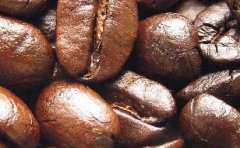The composition of coffee beans the bitterness and mellowness of coffee

Sugar: without sugar, you will not only feel the bitterness of caffeine and the sour taste of tannin, but also feel sweet, which is caused by the sugar contained in the coffee itself. After baking, most of the sugar will be converted to caramel, bringing a unique brown to the coffee.
Minerals: there are lime, iron, sulfur, sodium carbonate, phosphorus, chlorine, silicon and so on, because the proportion of very little affect the flavor of coffee is not big, combined to bring only a little astringent taste.
Crude fiber: raw bean fiber will be carbonized after baking, this carbon and sugar caramelization combine with each other to form the tone of coffee, but the fiber turned into powder will have a considerable impact on the flavor of coffee. Therefore, we do not encourage the purchase of powdered coffee beans, because we are unable to taste the flavor of the coffee.
The bitterness of coffee: the color, aroma, and taste of coffee are caused by complex chemical changes that take place during roasting. Therefore, raw beans must go through appropriate chemical procedures to achieve the most balanced state of its essential ingredients in order to be regarded as the best baked beans. The aroma of coffee changes with the heat, so the baking time should be shortened as much as possible, and the heat should be controlled at the lowest temperature that can produce effective chemical composition of coffee beans, that is, the time and heat of the shortest process, so that coffee beans can produce the most suitable composition ratio.
Aroma: aroma is the life of coffee quality, and it can best represent the coffee production process and baking technology, as well as the climate, elevation, variety, refined treatment, harvest, storage, roasting technology of the consuming country, etc. are the conditions that determine the aroma of coffee beans. The results of gas chromatographic analysis showed that the aroma of coffee was composed of acid, alcohol, acetaldehyde, ketone, ester, sulfur compound, phenol, nitrogen compound and nearly hundreds of volatile components. Generally speaking, fat, albumen and sugars are important sources of aroma, while lipids blend with the sour and bitter of coffee to form a smooth flavor. Therefore, the disappearance of fragrance means that the quality is getting worse, and the relationship between aroma and quality is very close.
Important Notice :
前街咖啡 FrontStreet Coffee has moved to new addredd:
FrontStreet Coffee Address: 315,Donghua East Road,GuangZhou
Tel:020 38364473
- Prev

Yunnan small grain coffee Bourbon Bobang AA grade
The western and southern parts of Yunnan small grain coffee Bourbon Bobang AA Yunnan Province are located between 15 N and the Tropic of Cancer, most areas are 1000-2000 meters above sea level, and the topography is mainly mountainous and sloping, with large ups and downs, fertile soil, sufficient sunshine, rich rainfall and large temperature difference between day and night. These unique natural conditions form the particularity of Yunnan small grain coffee taste.
- Next

Coffee growth knowledge Coffee growth habits
Coffee is a kind of drink, which gives the public the impression that it is black, bitter, sleepless and excited. The coffee beans we see in the coffee shop are tea-brown, which belongs to roasted coffee beans, while the color of the coffee liquid is amber. Coffee comes from coffee beans, which are harvested and processed from the fruit of trees. The growth habit of coffee: coffee
Related
- Detailed explanation of Jadeite planting Land in Panamanian Jadeite Manor introduction to the grading system of Jadeite competitive bidding, Red bid, Green bid and Rose Summer
- Story of Coffee planting in Brenka region of Costa Rica Stonehenge Manor anaerobic heavy honey treatment of flavor mouth
- What's on the barrel of Blue Mountain Coffee beans?
- Can American coffee also pull flowers? How to use hot American style to pull out a good-looking pattern?
- Can you make a cold extract with coffee beans? What is the right proportion for cold-extracted coffee formula?
- Indonesian PWN Gold Mandrine Coffee Origin Features Flavor How to Chong? Mandolin coffee is American.
- A brief introduction to the flavor characteristics of Brazilian yellow bourbon coffee beans
- What is the effect of different water quality on the flavor of cold-extracted coffee? What kind of water is best for brewing coffee?
- Why do you think of Rose Summer whenever you mention Panamanian coffee?
- Introduction to the characteristics of authentic blue mountain coffee bean producing areas? What is the CIB Coffee Authority in Jamaica?

